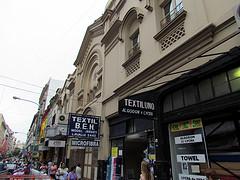 In March of 1860 the presidential succession takes place, assumes Derqui like President and Pedernera like Vice-president, Buenos Aires obtains that the National Treasure guarantees the budget by 5 years more, followed leading the Customs of Buenos Aires and it was hoped that it puts together its economy, meanwhile in San Juan was an institutional crisis that affects the Province of Buenos Aires. Art. 30 of the Constitution established that this could to be reformed in everything or part of her, reunited a congress with the approval of 2/3 of the Camera. In 1860 one reforms the Constitution and Integra to Buenos Aires. Main reforms: organic reform and dogmatic reform. In the Constitution of 1853 this settled down that Buenos Aires is the capital, does not accept and proposes that the capital is where the Congress arranges and approves by Law and had to be Federal the territory. Buenos Aires incorporates that to the congress the legislation corresponds to him, the rights of import and export and this will be until 1866, in addition it did not have to exist customs tariffs.
In March of 1860 the presidential succession takes place, assumes Derqui like President and Pedernera like Vice-president, Buenos Aires obtains that the National Treasure guarantees the budget by 5 years more, followed leading the Customs of Buenos Aires and it was hoped that it puts together its economy, meanwhile in San Juan was an institutional crisis that affects the Province of Buenos Aires. Art. 30 of the Constitution established that this could to be reformed in everything or part of her, reunited a congress with the approval of 2/3 of the Camera. In 1860 one reforms the Constitution and Integra to Buenos Aires. Main reforms: organic reform and dogmatic reform. In the Constitution of 1853 this settled down that Buenos Aires is the capital, does not accept and proposes that the capital is where the Congress arranges and approves by Law and had to be Federal the territory. Buenos Aires incorporates that to the congress the legislation corresponds to him, the rights of import and export and this will be until 1866, in addition it did not have to exist customs tariffs.
Art. 5: it established the obligations of the Provinces, had to dictate his own Constitution, the justice administration, the primary education, municipal government. It is eliminated 17 Art.s last paragraph (executions to lance and knife). The National Government will not dictate laws that restrict the Freedom of the Press. Art.
33: Implicit rights, the rights are not in restrictive form, but in enumerativa form. One derives the political rights. Art. 35: One considers the names of the National State (Argentine Republic). In the organic part, the reform that arises from Art. 64, says that the Congress will dictate citizenship laws. They must be beaten at the beginning of nationality citizenship (requisite of the president, one abroad demands to be natural or children to him of born Argentineans).